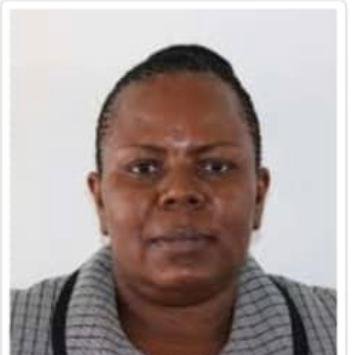
Dr Joyce Nyoni is senior lecturer and Rector at the Institute of Social Work in Tanzania, and is a current member of the ISC’s Committee for Freedom and Responsibility in Science (CFRS).
Joyce Nyoni has extensive research experience on HIV/AIDS in Africa and has advocated tirelessly for research ethics and integrity in Tanzania. CFRS Special Advisor Gustav Kessel, interviewed Dr Nyoni to mark World AIDS Day (1st December) and to help raise awareness of the AIDS pandemic.

Q: Since the 1980s, the HIV/AIDS pandemic has claimed the lives of almost 40 million people worldwide, and roughly that number again are currently living with the virus. Despite this, AIDS has largely left the public consciousness in much of the Global North and many people there are likely to be unaware of the picture in Africa. What is the state of HIV/AIDS research in Africa? Are public health measures adequate?
In Africa HIV/AIDS is much more prevalent than in Western or developed countries, and for us, every family has someone who has died of AIDS. But at a very general level we are seeing significant improvements. Infection rates have gone down over the past ten years, mother-to-child transmission rates are going down, and deaths as a result of AIDS are going down. People now live much longer. And we have seen a number of interventions taking place [a public health intervention describes an effort or policy to improve a population’s health]. People can access Antiretroviral Therapies (ARTs), but we also see interventions in terms of voluntary counselling and testing (VCT) and testing centres. Access to testing is not a major issue, but notifying partners can be. When one partner comes in for testing, we are trying to be innovative and to find the means to notify the other partner and to get them to come in for testing as well. Other interventions are, for example, all pregnant women in Tanzania are counselled to be tested as a measure to try and reduce mother-to-child transmission, and health providers are initiating testing with their patients, rather than waiting for people to go for testing. So there’s a lot that has been going on in Africa in terms of trying to understand the epidemic itself, but also in trying to address it. There have been mass-testing campaigns, especially for World AIDS Day, so knowledge levels are now very high in terms of people understanding transmission and prevention and how to access testing.
Q: Does this hold true across Africa or are there regional differences? And if there are, what is it that might drive them?
There are variations across Africa in the prevalence of HIV/AIDS. Some countries have high infection rates, especially countries in the southern part of Africa, such as South Africa, Namibia and Botswana. But for countries in the North, the infection rates are not as high. The reasons for these regional differences are complicated, and you have to look at HIV infection from a very holistic perspective. Poverty, education, culture and gender inequalities are factors that drive variation across Africa. Some countries, like South Africa, have seen a slight increase in infection rates over recent years. But what is most concerning is increasing infection rates among youths overall.
Q: What do you see as the role of science in addressing these concerns, and in combating the pandemic generally?
In Africa, the behavioural sciences, the social sciences, have been very important in terms of trying to understand the underlying reasons for HIV transmission and informing the context of why a particular group is more vulnerable than another. This is the kind of knowledge that has informed the health interventions that have been done, and on the one hand that has worked very well.
But on the other hand, when it comes to clinical trials, we are not seeing very much of this in the African context. In Tanzania, we do have a study looking for a vaccine, but a lot of the projects going on in Africa rely on external funding because governments have competing priorities. They have to deal with hunger and malnutrition, or COVID-19, and many other issues that require attention. Government funding for research is small and actually going down overall, so the investment level for a long clinical trial is just too high. So instead, for us the science comes in more through behaviour, understanding it and addressing it. Funding into HIV/AIDS research is much reduced now compared to 10 –15 years ago. We saw infection rates decline after very aggressive education campaigns to change behaviour, to get people to understand transmission and to use protection. But now, with time, we should not withdraw this effort, because we have a new generation coming up, and we need to keep up the same effort. It’s a problem that requires ongoing investment.
Q: So although science needs more investment, it plays a critical role, as access to the benefits which science provides is essential to health and wellbeing. Is access to treatments, tests and prevention equitable in Africa? What are the challenges?
From my point of view, I can say that in Tanzania it is equitable. There is equality in the sense that the testing centres are there, testing is free and available even at village health facilities, and if you test positive you get counselling and drugs to take. So overall, this is a good example of providing access to the benefits of science. One issue is that, yes, there are male condoms available, but there are not a lot of female condoms. This means there is a power imbalance in discussing condom use, especially for young girls. Female sex workers say that a female condom would give them more protection because they don’t have to negotiate its use. This is a problem in terms of equitably accessing preventative measures. Another issue is with stigma. Some people travel six hours to get tested or to take medication at a location where other people won’t know them.
Q: Your research makes clear that stigma must be a crucial consideration when attempting to understand this pandemic. Homosexuality is a social taboo and homosexual relationships are criminalized in Tanzania. What challenges does this create for HIV/AIDS research?
Same-sex relationships are not an open part of our culture, and you don’t openly say that you are doing research on same-sex relationships. It’s something the community doesn’t want to talk about, and there were times when research was seen as promoting homosexuality. This varies across Africa. In South Africa, for example, homosexuality is not so much an issue. But in countries like Tanzania, where it is criminalized, getting people, and especially policy makers, to understand the need to conduct research and advocacy in relation to same-sex relationships and AIDS prevention is a big challenge. Same sex relationships are not targeted by health interventions and community programmes. It is very important that we take a holistic view when researching HIV/AIDS to include diverse population groups.
Q: If the society doesn’t want to talk about it and may even be opposed to research including same-sex relationships, whose responsibility is it to ensure scientific freedom in HIV/AIDS research?
If there is scientific value in something for HIV prevention, then we as researchers have to do it, we have to study it, and we have to stand on science. But also, we must build the capacity of African countries to actually undertake their own research and to have access to the required technology and funding.
Q: What would you like to see change?
Science should come up with a more advanced treatment that is much easier and less conspicuous to use. Maybe one injection or a single pill. We saw this happening with COVID, why is it taking so long with HIV? We need a treatment that does not put a burden on the person using it, and this would help fight the stigma associated with HIV infection.
Q: Do you have a final message for our readers, especially those from the Global North, where AIDS is not as prevalent? Why is HIV/AIDS research important?
In the 8Os, AIDS used to be a death sentence. Now, I know people who have lived with AIDS for 30 years, and the quality of life for people with AIDS has improved significantly. But there is still work to do, and quality of life can be improved further. It is also a human right to have access to the benefits of science, such as quality health care. Is what we have now, with having to take several different drugs, the best option? Will we get to a vaccine? Advances along these lines will benefit everybody, including people in countries where HIV/AIDS is less visible.

Freedoms and Responsibilities in Science
The right to share in and to benefit from advances in science and technology is enshrined in the Universal Declaration of Human Rights, as is the right to engage in scientific enquiry, to pursue and communicate knowledge, and to associate freely in such activities.
Image by World Health Organization (WHO).